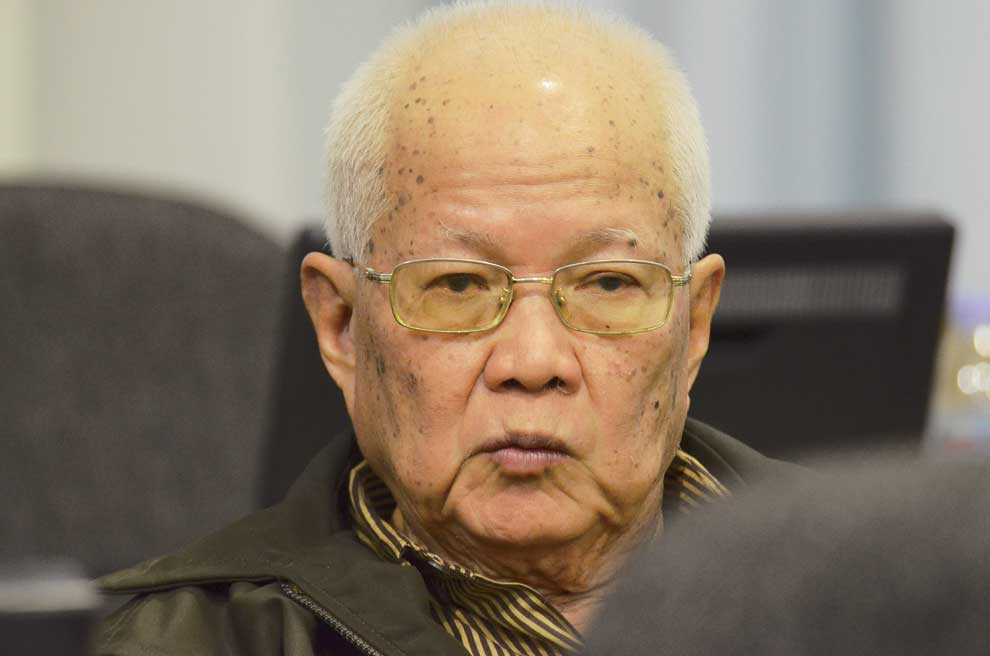
Khmer Rouge former president Khieu Samphan attends testimony at the Court Room of the Extraordinary Chambers in the Courts of Cambodia last year. REUTERS/ECCC
Dear Editor,
Khieu Samphan stands accused of having participated between 1975 and 1979 in a “joint criminal enterprise” with the alleged purpose to establish a communist state through the implementation of five criminal policies: evacuation of cities, creation of cooperatives, elimination of “enemies”, persecution of minorities and policy on marriages.
At the beginning of his trial, confident in justice, Khieu Samphan expressed his willingness to explain that although he took part in the Pol Pot regime, he never participated in the elaboration or implementation of these “criminal policies”.
At the beginning of the trial, the Chamber decided to do something no other international court had done before: divide up one trial into several “mini-trials”. None of the initial charges have been dropped, but they will be adjudicated in different trials. The purpose of this “severance of charges” was to enable the tribunal to render a verdict before Khieu Samphan and his co-accused became unfit to stand trial.
The first set of facts the Chamber has decided to examine in the first “mini-trial” is, inter alia, the evacuation of Phnom Penh in 1975. Whilst the Prosecution has repeatedly challenged this severance, thereby delaying the proceedings, Khieu Samphan decided to abide by it, hoping for a speedy trial.
During the course of the first trial, the Chamber heard dozens of witnesses and admitted as evidence thousands of documents proposed by the Prosecution. Facing this incredible mass of documents, the Defense expressed many concerns, which were ignored by the judges. According to the judges, the value of these documents would (needless to say) be discussed and evaluated at the end of the trial, once the entirety of the evidence had been presented.
A few weeks before the end of the first trial, Khieu Samphan requested time and facilities to prepare for his examination by the tribunal: to be provided with a listing of the topics, questions and documents he should be prepared to answer to; to have three weeks for preparation with his lawyers visiting him every day; to testify in the morning when his physical condition is the least impairing.
A few days before the end of the first trial, after denying all of these requests, the judges also decided to deny the possibility of a real discussion on the mountain of evidence admitted (and still to be admitted) during the course of the trial. The Defense is now being told that it had the opportunity to discuss the value of documents considered “essential” by the Prosecution during hearings where no time for a response by the Defense lawyers was scheduled! Moreover, the Defense will be allowed no more than 100 pages of closing brief to discuss the value of 92 testimonies and 6,300 documents yet to be admitted and nine hours to orally “summarise” its arguments and to “respond” to the Prosecution’s 200-page closing brief, this final document which will not be translated into a language which either Khieu Samphan or his lawyers understand.
While hindering the Defense from discussing the evidence presented in the course of the first trial allegedly devoted to the policy of evacuation, the Chamber surprisingly announced it would adjudicate within the realm of the first trial the responsibility of Khieu Samphan with regard to all criminal policies implemented by the Pol Pot regime. This is shocking for two reasons. Firstly, Khieu Samphan’s lawyers were never given the opportunity to refute allegations relating to the elaboration and implementation of these other policies. Secondly, it means that the next “mini-trials”, the purpose of which will be to examine the crimes committed in connection with the implementation of the other four policies, will be held after Khieu Samphan’s responsibility has already been adjudicated in relation thereto.
It is now obvious that the dice are loaded. In its “race against death” conducted in the guise of a criminal trial, the Chamber has never been interested in what the Defense has had to say. Regularly cutting the microphones of the Defense lawyers and sanctioning those who protest is nothing other than the visible tip of the iceberg.
When Khieu Samphan announced that he had no choice but to remain silent because his rights to a fair trial had been gravely violated, the Prosecution suggested to the court that he be granted some time to prepare his examination. This offer is a trompe l’oeil and is meaningless, in the manner of this show trial.
Khieu Samphan no longer trusts his judges who are not interested in giving him the means to explain that although he took part in the Pol Pot regime, he never participated in the elaboration or implementation of the five alleged “criminal policies”. Silence is his only way of protesting until the final statements.
Anta Guisse, Kong Sam Onn and Arthur Vercken, counsels for Khieu Samphan.
Contact PhnomPenh Post for full article
Post Media Co LtdThe Elements Condominium, Level 7
Hun Sen Boulevard
Phum Tuol Roka III
Sangkat Chak Angre Krom, Khan Meanchey
12353 Phnom Penh
Cambodia
Telegram: 092 555 741
Email: [email protected]









